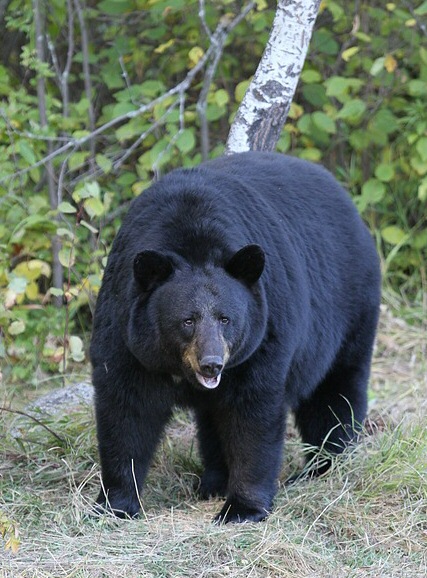Arnold, CA…The California Department of Fish and Wildlife (CDFW) and the U.S. Forest Service remind citizens visiting or living in the high country and foothills that fall is the time of year for increased bear foraging activity and more human and bear encounters are possible. California black bears are typically active and foraging between April and mid-fall, but in autumn, black bears experience changes in metabolism that drives the need to consume as many rich calories as possible. This metabolic spike is an important signal to the bear to bulk up and gain the fat that will sustain the animal through hibernation and periods of lean food sources. Scientists estimate that black bears may forage as many as 20 hours a day at this time.

During this transition, residents in bear country are asked to diligently manage food, garbage and other attractants around the home and yard in order to avoid attracting bears. Residents leaving cabins for the season should remove all attractants from the cabins, and seal and lock all doors and windows. Crawl spaces under houses or porches should be sealed in order to prevent them from becoming denning sites.
Here are things to know:
Bears have a sense of smell seven times stronger than a bloodhound and eyesight as good as a human’s
Any scent, especially one of odorous foods like fish or other meats, may attract a bear to your home and yard
Remove bird feeders completely until later in the year
Remove fallen fruit off the ground promptly
Use bear-resistant garbage cans and wait to set trash out until the day of pick up
Store pet food inside
Do not leave food or other scented items in your car
Bears fed intentionally or unintentionally by people may become bold and aggressive-they may be killed if they
become a threat to public safety or cause property damage
In the rare event a bear breaks into your home, move to a safe location and contact local authorities. Wildlife experts caution against directly confronting the bear or blocking the bear’s escape route.
Visitors to bear country should act responsibly and be mindful of their safety while in bear habitat. Camping season is ending in many areas, but with the cooler temperatures, fall hiking is very popular in the mountains and foothills and visitors often flock to salmon spawning sites in hopes of getting a glimpse of a bear. Wildlife experts offer these important tips:
Be alert on trails (avoid wearing headphones)
Keep a respectful and safe distance from bears at all times
Do not attempt to take “selfies” with bears or other wildlife
Never feed a bear – it is unlawful and dangerous to people and may result in the needless death of a bear.
For an expanded list of living and recreating in bear country, please visit www.wildlife.ca.gov/keep-me-wild/bear.
For information about being, bear aware while visiting national forests, please visit https://www.fs.fed.us/visit/know-before-you-go/bears.
To learn more about black bear ecology, please visit www.wildlife.ca.gov/conservation/mammals/black-bear/biology.
# # #
Please do not reply to this e-mail. CDFWNews@wildlife.ca.gov is for outgoing messages only and is not checked for incoming mail. For questions about this News Release, contact the individual(s) listed above.
Like us on Facebook Follow us on Twitter
To unsubscribe or update your subscription, see links at the bottom of this message.
When you file your California income tax return, please consider making a voluntary contribution to the California Sea Otter Fund (line 410) or the Rare and Endangered Species Fund (line 403). Thank you!
Persons with disabilities needing reasonable accommodation to participate in public meetings or other CDFW activities are invited to contact CDFW’s Accessibility Coordinator at (916) 651-1214, the EEO Office at (916) 653-9089, or send an email to EEO@wildlife.ca.gov. Reasonable Accommodation requests for facility and/or meeting accessibility should be received at least 21 days prior to the event. Requests for American Sign Language Interpreters should be submitted at least two weeks prior to the event, and requests for Real-Time Captioning at least four weeks prior to the event. These timeframes are to help ensure that the requested accommodation is met. If a request for an accommodation has been submitted but due to circumstances is no longer needed, please contact the Accessibility Coordinator immediately.


